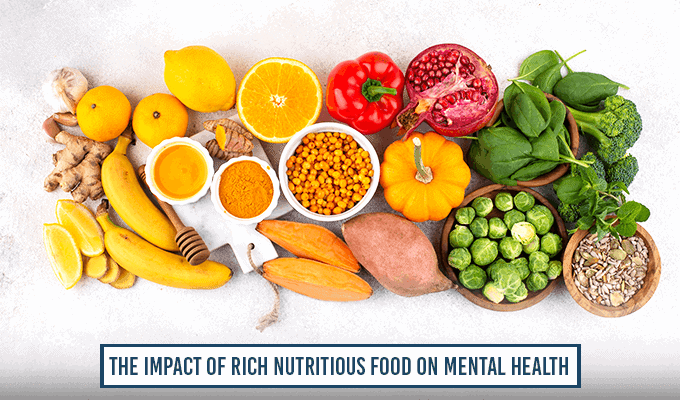Looking For A Personal Fitness Trainer in Mumbai? Call Me Now on +91 98706 36408 | Email Us at: [email protected]


Happy? Excited? Sad? Depressed? Any emotions we experience, food is the comfort we turn to. It is a well-known fact that what we eat affects our physical appearance. But, food also has a profound effect on mental health too. Nutrition-rich foods have a positive effect on mental well-being and mood regulation. Omega 3 promotes healthy brain functioning, whereas B complex vitamins stabilize the mood. Mindful eating of rich nutritious food results in a healthier mind.
Contents
There is a direct impact of nutrition on mental health. A neurotransmitter named serotonin regulates brain functions like sleep and hunger, mediates moods, and inhibits pain. This serotonin is produced in the gastrointestinal tract which is lined by millions of neurons. The production of serotonin is directly influenced by the amount of good bacteria in the gut which are produced with clean nutritious food. The good bacteria inhibit the growth of bad bacteria, reduce stress, prevent inflammation in the body, and maintain mental health by providing a direct passage of nutrients via the gut neurons directly to the brain.
We get a high after that bowl of ice cream or dessert, but the result is short-lived. Sugar gives a mental rush, as it might temporarily increase levels of dopamine that enhance the mood. But this happens at the cost of increasing bad gut bacteria and reducing the good bacteria. This imbalance in the gut bacteria might lead to mental instability, emotional stress and impaired brain function. The intake of nutritious foods like omega-3-rich oils, nuts, fruits, and vegetables, increases the levels of dopamine and serotonin in the body. A well-balanced level of dopamine and serotonin has a positive influence on mood.
With emotional turmoil, we often turn to high-sugar and processed foods for comfort, unaware of what foods are good for mental health. The simple sugars increase inflammation in the body leading to the destruction of the neurons in the intestinal lining and killing the good gut bacteria. Reduced good bacteria in the gut leads to impaired absorption of adequate nutrition and lack of direct supply of nutrients to the brain. Lack of a nutrition-rich diet can lead to a disoriented brain, anxiety and depression. Switching from high-sugar foods to healthy omega-3-rich and antioxidant-rich foods will help better cognitive function and uplift the mood.
Our brain is working nonstop even when the body is asleep. The brain cell keeps building new proteins, cells and tissues. There is constant wear and tear in the brain cells. To compensate for this wear and tear, the brain cells need a balanced nutrition that is rich in good-quality carbohydrates, proteins, fats and multivitamins. Consume a variety of foods like nuts, healthy oils, dark green leafy vegetables, fresh fruits and vegetables and good quality protein to maintain the gut bacteria and optimal mental health.
A good diet for mental health works wonders for brain function and mood regulation.
Whole grains: Whole grains are rich in complex carbohydrates that provide fuel for brain function. Whole grains are also high in fiber which helps to increase the good bacteria in the gut. Include grains like whole wheat, brown rice, quinoa, oats, millets like nachani, bajra and jowar.
Proteins: Proteins help in the production of new cells and brain function. It provides the nutrition required for the wear and tear of the cells. Good quality proteins get easily absorbed in the body and provide all essential amino acids required by the body. Consume proteins like lean meat, chicken, egg, fish, low-fat milk and products, pulses, dals, sprouts, soy and products.
Healthy fats: Healthy fats rich in omega-3 fatty acids help to reduce inflammation in the body, improve gut lining, enhance brain function and mediate good mood. Include foods like olive oil, coconut oil, fish and fish oils, flaxseeds, chia seeds, nuts, avocado and omega-3 fortified foods.
Fresh fruits and vegetables: Fruits and vegetables are rich in B complex vitamins, minerals, fiber, antioxidants, and anti-inflammatory nutrients. B complex vitamins help in mood regulation. Fiber helps in creating a favourable environment for the growth of good bacteria in the gastrointestinal tract. Antioxidants help to reduce stress and enhance mood. Anti-inflammatory nutrients help to reduce the inflammation in the brain cells. Include as many coloured fruits and vegetables in your daily diet as possible.
Water: The brain needs nutrients along with adequate water to prevent dehydration. Dehydration might lead to an imbalance in the electrolyte and fluid balance in the body leading to impaired brain function. Inadequate water intake might also lead to mood swings and anxiety. Consume a minimum of 1.5 to 2 liters of water daily.
We are what we eat. Eating clean nutritious food helps our brain to function efficiently. Focus on foods mentioned above that help to increase good bacteria in the gut that help improve brain health and manage mood. Do not forget to include enough fluids in your daily diet to maintain brain health. Make healthy eating part of your lifestyle for long-term benefits and sustain mental wellness. For a good diet for mental health connect with one of the best personal fitness trainers in Mumbai.